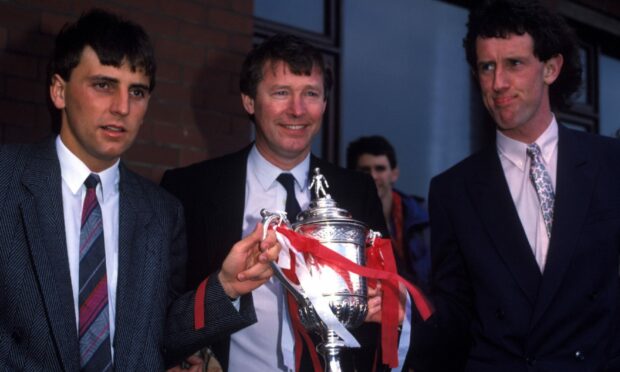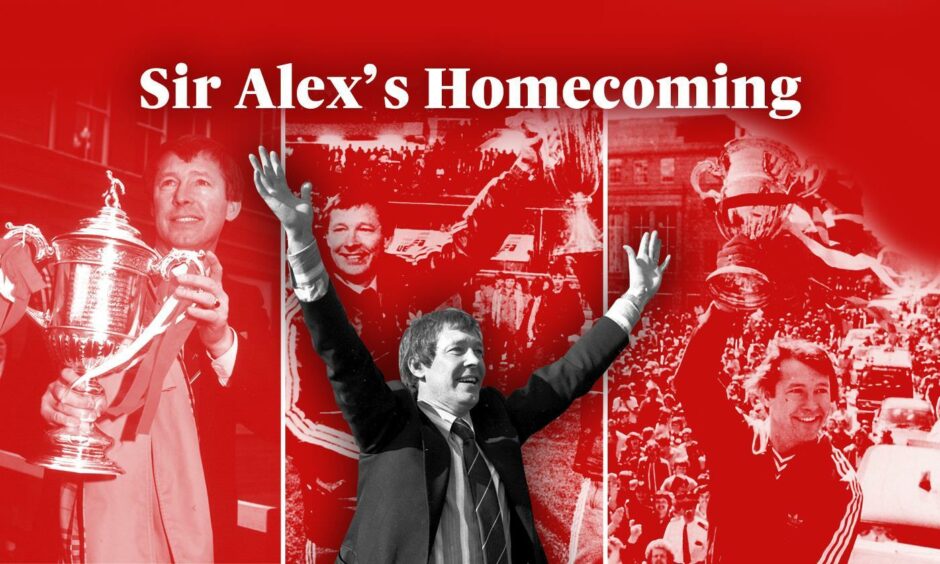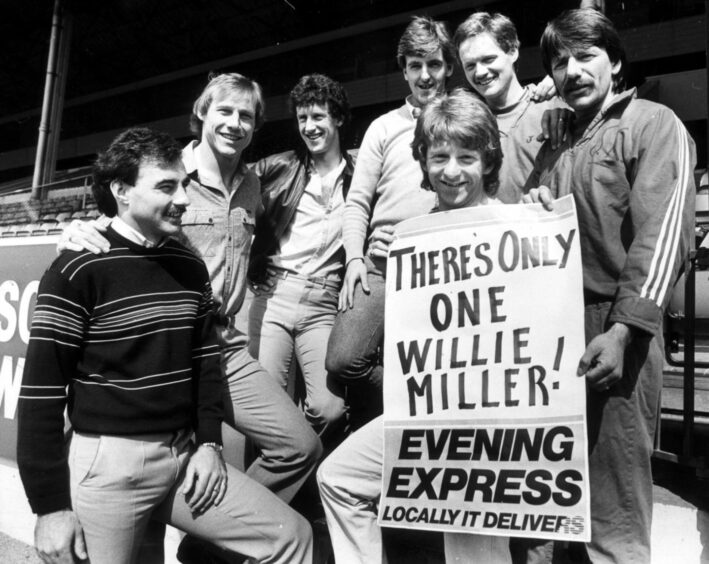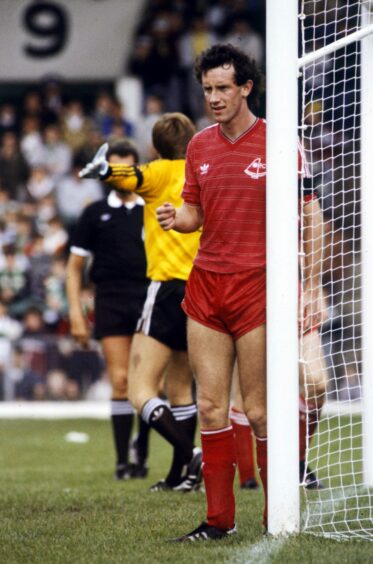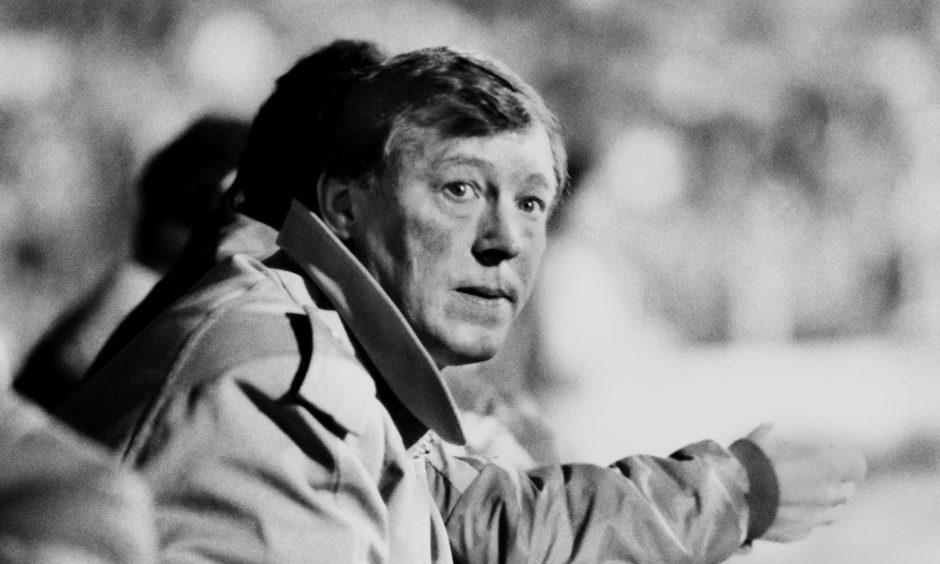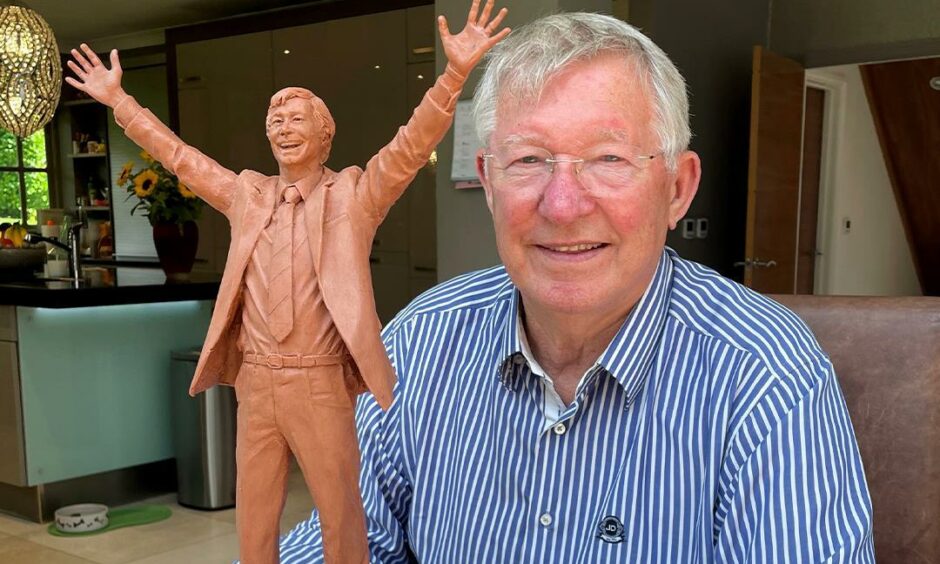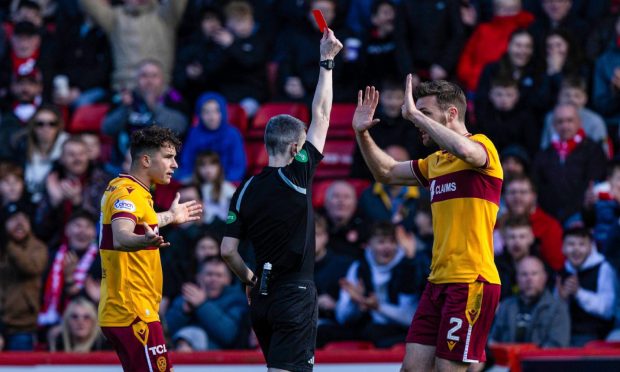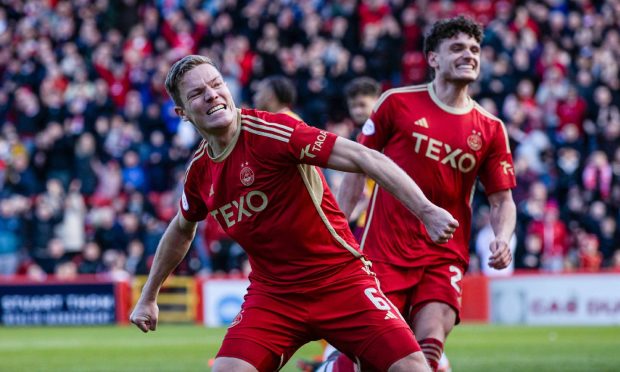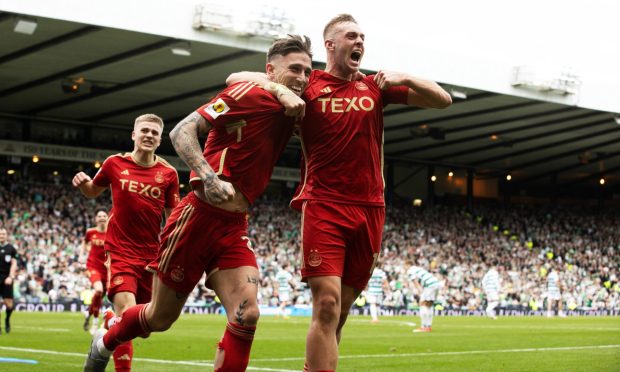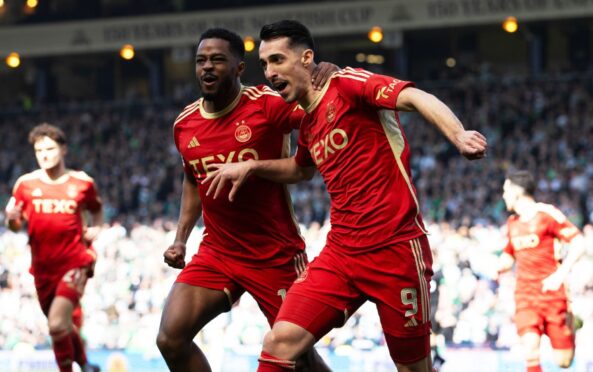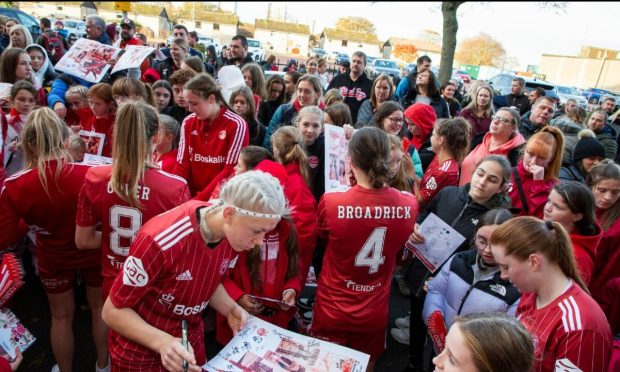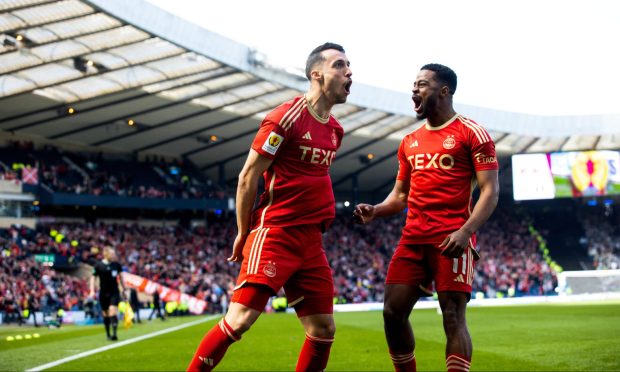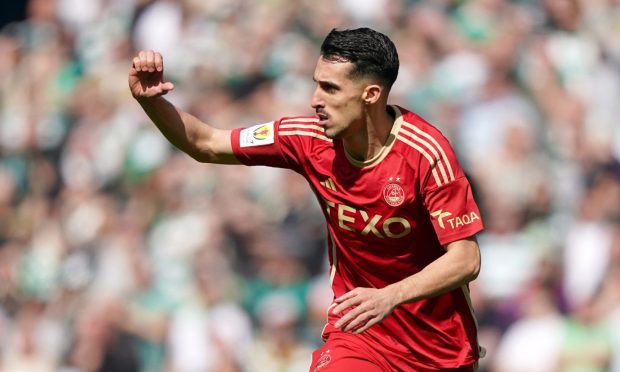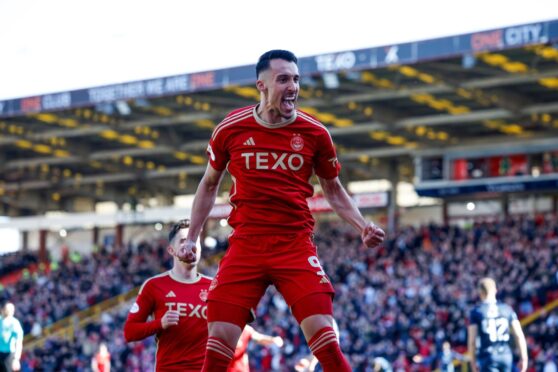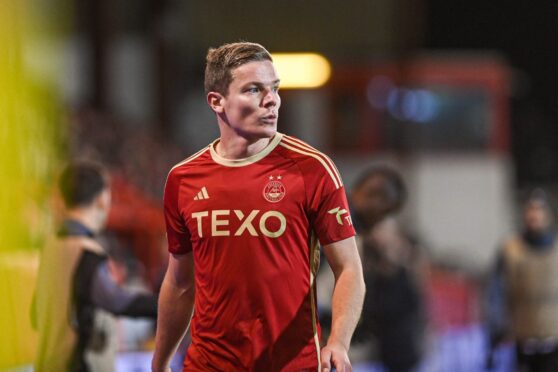As Sir Alex Ferguson prepares to return to Aberdeen for the unveiling of a statue in honour of his achievements at the Dons we look ahead to the unveiling with former players and colleagues.
Billy Stark believes Sir Alex Ferguson’s unquenchable thirst for success and ability to wring out every last ounce of effort from his players is what sets him apart.
The midfielder worked for Sir Alex, long before the knighthood, not once but twice in his playing career.
Ferguson brought him to Saints from Anniesland Waverly in 1975. He clearly made such a good impression on his manager than Ferguson made two attempts to bring Stark to Pittodrie following his move to Aberdeen in 1978, his second attempt finally paying off in the summer of 1983.
Stark quickly realised little had changed from the 32-year-old Ferguson who brought him to Love Street and the man who greeted him at Pittodrie eight years later.
He insists today, he would not have it any other way.
Stark said: “I can say this much, there was no difference in that between St Mirren and Aberdeen but there was a difference in the calibre of players he worked with.
“He is a very intelligent man. He inherited a squad full of good players and full internationals which he had not been used to dealing with.
“He had been at East Stirling for four months as a manager when he got the St Mirren job in November of 1974.
“It’s important to remember he was only 32 when he took on the first managerial job.
“He was very much still in the embryonic stage, particularly with St Mirren being a higher profile job and he elevated them with his ambition and his drive.”
Stark had to wait for his chance to follow Ferguson to Pittodrie
For Stark, having to wait until 1983 meant he missed out on being part of the biggest moment in Aberdeen’s history.
He said: “Sir Alex left St Mirren in 1978 and within a couple of years I was told unofficially there had been some money and a player offered from Aberdeen for me but obviously it didn’t happen until he eventually got me in 1983.
“You wonder seeing them win the league title in 1980 and the Scottish Cup and European Cup Winners’ Cup wins what might have been.
“But I was just grateful for the time I had and the success I had which was unparalleled in Aberdeen’s history.
“It won’t be repeated due to the Old Firm’s financial strength now but that makes what the club did in that period all the more special.”
Ferguson was fearless in his pursuit of glory
Ambition and drive are fitting words to describe the fearless Ferguson and it comes as no surprise to hear former players and colleagues talk of his pursuit of glory.
Ferguson’s adaptability is perhaps another key quality which has not been given the same recognition.
Stark said: “When I signed for St Mirren he got rid of a lot of senior players to sign Frank McGarvey, myself, Lex Richardson and Bobby Reid.
“It was a huge influx of young players which is something which has been consistent through his managerial career.
“At Aberdeen you had Neale Cooper, Neil Simpson, Eric Black, John Hewitt and various others and he continued that at Manchester United.
“That philosophy becomes tougher the bigger the club and expectation but he didn’t waver at all.
“There was hearsay he found it a wee bit difficult when he first arrived but he quickly learned how to manage the likes of Willie Miller, Drew Jarvie, Bobby Clark and Joe Harper.
“That’s part of the genius of him, his ability to adapt from starting out at East Stirling to working with millionaire footballers at Manchester United.
“It speaks volumes of him that he was able to do that even when the game evolved.”
Famous Ferguson temper made players better
In a previous interview with the Press and Journal, Stark spoke of the infamous temper his former manager made no attempt to hide.
But he was far from daunted by the prospect of being on the end of the man’s wrath. If anything, it helped make him a better player.
He said: “I had the hairdryer treatment for most of my career. The man was there to gently encourage me for three years at St Mirren and nearly four at Aberdeen.
“He has said in interviews sometimes you have to show your anger in players and he never lost that. When I look back between St Mirren and Aberdeen there was little difference in that respect.
“We would come in at half-time thinking we were doing well and in the game but there was always someone he would go for at half-time. You sat there wondering if it would be your turn.
“There were times you thought you had just had a nightmare and he left you be and the next time you had played well and were the player he went for.
“Half-time was only 10 minutes in those days and he always used that time for dramatic effect. You could be 3-0 up against Rangers or Celtic at Pittodrie and would think he would be delighted.
“He was but he didn’t show it too much as he knew if you give players any sort of hint of complacency they would take full advantage of it.
“He never allowed complacency to settle in anywhere. It was the biggest enemy for him.”
Parting of the ways in 1986
For Stark, the player and manager relationship with Ferguson would end in 1986 when Manchester United succeeded where other clubs had failed in luring him away from Pittodrie.
It was the end of a trophy-laden era, the likes of which are unlikely to be repeated.
Stark was sad to see his manager move on but he was not surprised.
He said: “It is well documented Rangers and Tottenham in particular wanted him and I think he had an intuitive feeling about waiting for the right club.
“In the build-up to the World Cup in 1986 in Mexico he took the squad to Australia to prepare for the play-off game. He was away for a week in December 1985 with the national team which was bizarre.
“He was there 24/7 so it was very strange to not have the hairdryer treatment or that demand in training.
“Teddy Scott and Willie Garner took training at the time but when the manager was there he cast a different light.
“He never missed training, never in my memory, which is why going away with Scotland stands out.
“I think in the end the World Cup involvement increased his profile even further.”
Ferguson would not rest until he got his man
The saying goes that a verbal contract is not worth the paper it is printed on but Billy Stark knows Sir Alex Ferguson was not a man to take any signing for granted.
Ferguson believed he had got his man after convincing free agent Stark to leave St Mirren for Pittodrie in the summer of 1983.
But reports of interest from other clubs had Ferguson quickly diverting his attention away from a prestigious awards dinner to call the midfielder to make sure he was not about to renege on a verbal agreement to join the newly-crowned European Cup Winners’ Cup champions.
Stark recalls: “In the final analysis joining Aberdeen was straightforward but in 1983 freedom of contract was not how it is nowadays. If a club wanted to sign you they could if they agreed a fee or else it went to a tribunal.
“It was always a bit fraught going to a tribunal but Aberdeen agreed a fee with St Mirren. Dundee United and Rangers had also been on looking to sign me.
“United, with the success they had, and Rangers with their status were good options but I chose Aberdeen.
“I remember having agreed to sign on the phone and making arrangements to come up to Aberdeen to formalise it.
“In between that happening he was at the PFA awards in England with Archie Knox when a rumour started I had agreed to sign for Rangers.
“My phone went and it was him enquiring quite forcibly if that was the case.
“There was nothing in it but I dare to think how he would have taken it had I done that to him. He would have mauled me.”
Making the grade at Pittodrie was a huge challenge
For Stark, moving to Pittodrie was an easy decision. But establishing himself as a regular in a team at the peak of its powers was another matter.
He said: “I felt it was the right decision at the time and it was proved right. I wanted to win major honours and with the other clubs there was a chance but I knew Sir Alex and his squad of players.
“That was the big thing for me. Making the decision to join was easy. Getting into the team was the bigger challenge and I didn’t go there thinking I would walk into the team.
“I had to improve my fitness and be able to play to a level he demanded to be selected.”
New Firm derby is a fitting game for Sir Alex’s return to Pittodrie
Sir Alex Ferguson will be guest of honour at Pittodrie this weekend when the Dons face Dundee United at Pittodrie.
The former Dons boss is back in the Granite City for the official unveiling of a statue in his honour at Pittodrie on Friday and will take his seat to watch his former team take on United 24 hours later.
For Stark, the memorably rivalry with United and their former manager Jim McLean makes for a fitting backfrop for Sir Alex’s return to Aberdeen. United also play a significant role in his own career.
He said: “It’s quite fitting that he is up the weekend of the Dundee United game given the rivalry with Jim McLean.
“I can remember games against United too and the Scottish Cup semi-final defeat in 1985 is one I recall vividly because my daughter was born in between the two games.
“We played on the Saturday at Tynecastle and she was born on the Sunday morning.
“It worked out for me as Sir Alex would never have given you time off when there were games on.
“I remember I should have scored as I hit the underside of the bar in the first game and then we lost the replay 2-1 despite Ian Angus scoring.
“We were in good shape in the league that year and desperate to do the double but it wasn’t to be.
“My wife and I loved Aberdeen and our two daughters went to university there so Aberdeen has always been a special place for our family.”
